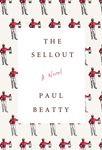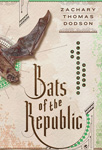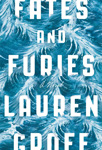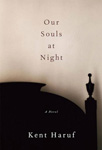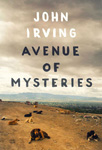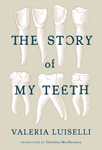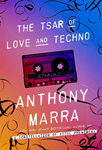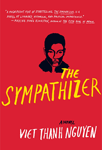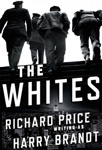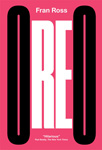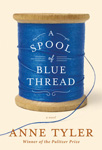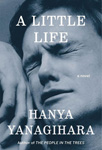by Chris Adrian and Eli Horowitz
Buy it at Powell’s »Danielle Henderson: This is a brutal decision between three of my all-time favorite literary topics: black weirdos, white guilt, and terrible, horrible, no good, very bad parents. It’s not a facet of judging this contest that I find a link between anything I’m reading, but a few themes definitely bubbled up to the surface.
When I read the jacket copy, I was worried that I wouldn’t find a good way into Anne Tyler’s A Spool of Blue Thread for the same reason I stopped watching Noah Baumbach movies a few years ago: Time is finite and I simply cannot fill my life to the brim with stories about neurotic white people. That’s less an implicit bias and more of a cultural exhaustion. Part of the problem is that there’s a great deal of time spent describing the family house on Bouton Road. I’ve lived in apartments my entire life, and lengthy descriptions of houses often make me jittery with stupidity. I’ve never in my life measured something by the square foot. What the fuck is a spindle staircase? Do I have to consult the Property Brothers to make sense of how this house looks in my head or can I just get on with it?
The initial description of Abby and Red Whitshank (the married couple at the center of this winding generational tale), their four adult children, and the “lovingly worn” Baltimore house that serves as home base for all of their sprawling families and wide-reaching emotional issues made me believe I was about to be Baumbached, so I consciously read it over the course of a few mornings with a full French press. The first half was a little boring but clearly foundational; the Whitshanks have a wayward son, Denny, who selfishly wreaks unspeakable havoc on their otherwise sedentary lives, and everyone keeps trying to figure out how to handle him. He’s absent a lot, so you get the bulk of his story through the eyes of other characters. I liked that; it heightened the mystery of what could possibly be going on with this dude, and made the other characters more sympathetic or unlikeable based on their reactions to him.
There’s a point where the book pivots, and Spool finally picks up steam in a way that makes it nearly impossible to put down. Tyler masterfully bobs in and out of the Whitshanks’ family history, revealing and explaining long-held secrets in a way that had me completely captivated. We always want to give parents the benefit of the doubt, but some people are just born bad, and adding kids into the mix doesn’t level out the bumpy parts of a personality.
What I wasn’t expecting was Tyler’s subversive but thorough examination of masculinity as subtext, or the close examination of class issues from the perspective of people who seem to have done fairly well for themselves.
Oh, always, always it was us-and-them. Whether it was the town kids in high school or the rich people in Roland Park, always someone to point out that he wasn’t quite measuring up, he didn’t quite make the grade. And it was assumed to be his own fault, because he lived in a nation where, theoretically, he could make the grade. There was nothing to hold him back. Except that there was something; he couldn’t quite put his finger on it. There was always some little tiny trick of dress or of speech that kept him on the outside looking in.
The attention paid to class and masculinity is also a crossover point in Paul Beatty’s The Sellout, with a healthy mix of racial tension tossed in. Generally, I don’t read prologues (I know), and certainly not one over 20 pages long. They seem pretentious and disruptive, and I just want to get down to brass tacks without having parts of the book ruined before I even read the first chapter. Life is short—get me into that story!
I had to read this prologue because it was part of my homework, and I’m glad I didn’t skip it. Not only does it set up the story, it conveys the strange rhythms, academic leaps, and hilarious premise of the entire book. This book dives into our cultural issues with race right away and, thankfully, never quite slows down.
I sit in a thickly padded chair that, much like this country, isn’t quite as comfortable as it looks.
I felt like The Sellout is doing the work of five books at once, but in a way that’s completely delightful. Its framework is different—there’s a rhythm to get into as the narrator tells you what it means to grow up in “Dickens, a ghetto community on the southern outskirts of Los Angeles”—but it still deftly interrogates so many aspects of black consciousness in a way I never thought I’d get to see in my entire black-ass life.
When we first meet the narrator, he’s sparking up a joint in the Supreme Court, on trial for the crime of owning a slave and reintroducing segregation when LA County decides to wipe Dickens off the map. Slave ownership wasn’t the narrator’s idea, but that doesn’t stop him from having to deal with it when Little Rascals cast member Hominy Jenkins shows up in his yard demanding to be whipped. I won’t spoil the plot of how we even get to that point, because I kind of can’t even begin to describe the winding road of absurdity and humor that Beatty deploys to do it. It feels like an experience as you’re reading it because it absolutely is.
At the center of this crazy trial is the story of a father and son, but not in the way you’re used to reading about that relationship. The story takes flight when the narrator’s father, a controversial sociologist who uses his son in racial experiments, is gunned down in the street by the LAPD. The narrator is well-versed in his childhood abuse—being electrocuted, or beaten with the DSM-IV, for example—but explains it for what it is: his life as a failed experiment. It gives him a sort of immobility, or at least a very specific idea of who he is as tied to a very specific place, so when his town is literally disappeared he does what he can to take it back, however laconically.
I feel like Paul Beatty and the narrator would both hate this academically inclined description of the book, which just makes me love it more. The narrator is brilliant, but it rubs him raw to see people living and saying things in a way that seems performative, and Paul Beatty, a master of thoughtful examination, just seems to want us all to lighten up a little bit.
The narrator might be a failed social experiment, but by embarking on an ambitious and regressive social project he points a finger at how the social experiment of race has failed so miserably in the United States.
My vote is for Paul Beatty’s The Sellout. A Spool of Blue Thread deftly lays out the ways you can do everything right for your family and still have things go horribly wrong, but much like 1984 or the way we let Vanilla Ice infiltrate rap, The Sellout is going to serve as a diagram of our cultural failings that will hopefully be studied for millennia.
Match Commentary
By Kevin Guilfoile & John Warner
Kevin: One of the curious aspects of the ToB is that it sometimes puts you in a position where you are “rooting” for books, which is kind of absurd. That was one of our intentions when we started this thing as a parody of book awards—we thought it was funny to contemplate what it means to think about literature in the context of “winning.”
I know you and I are both “rooting” for The Sellout, and when yet another judge fits it with the laurels of unambiguous praise, a little cheer escapes my throat. I can’t help it, even though I liked A Spool of Blue Thread very much. I think part of the reason why is specifically because it’s so funny. Laughing is something we want to do together, perhaps as opposed to contemplating, as Judge Henderson eloquently puts it, “the subversive but thorough examination of masculinity as subtext.” The Sellout is every bit as profound as the other novels on this list, and certainly more profound than some of them. Laughter is just so powerful. It creates a culture in which great ideas can not only grow, but also get passed between us.
John: A Spool of Blue Thread is a very good novel. I would recommend it without hesitation to just about any reader. But The Sellout just seems like something more important than a good novel.
Kevin: Judge Henderson ends her analysis with a bit of intentional hyperbole about The Sellout joining the shortlist of texts that, like the Bible and the Iliad, will “hopefully be studied for millennia.” That got me thinking about it, though. The Sellout seems like such a book of the moment, from the very first scene (which she references in her judgment) in which a sympathetic cop sparks the narrator’s hash pipe in the chambers of the Supreme Court. Will this book be as funny in 30 years? Will it be funnier? Will the specific America it describes be recognizable in 2066? These are impossible questions to ask about any book, but just raising them highlights the immediacy of Beatty’s satire for me.
John: When we are talking about the Trump political dynasty as Ivanka finishes up her third term—the Constitution having been amended—we may look back on The Sellout as a kind of Rosetta Stone of the age, though maybe it will be read as prophecy rather than satire. I find The Sellout (and all good satires, really) simultaneously disturbing and comforting. If what’s discussed and depicted didn’t feel at least a little bit true, it wouldn’t be funny.
But because it’s so funny, it acts as a balm. Mike Judge’s Idiocracy has a former professional wrestler (played by Terry Crews) as a president who fires off automatic weapons in Congress. It’s ridiculous, except we are significantly closer to an Idiocracy than we were this year last time–perhaps distressingly close.
Except, is that really true? Whatever has been unleashed by the election was obviously present in the populace last year. It’s probably always been there, but it has taken a Trump candidacy to bring it into the light. Following the South Carolina primary, exit polls captured that 20 percent of Donald Trump’s supporters wish slaves had never been emancipated. Clearly, that’s not a new attitude.
Kevin: Years ago, I worked with a woman who was absolutely convinced (and who could not be dissuaded by me) that if you lived in another time zone you actually lived in the future. We used to be able to count on people like her to not vote. This is no longer true.
John: One of the stories in my most recent book is about a group of frat brothers who decide that it would be cool to waterboard their pledges because that would set them apart from other houses. I was working off of an urban legend on the University of Illinois campus that there was a fraternity at which pledges spent a semester raising a puppy and then, to prove they wanted to join, had to kill the puppy with their bare hands. I thought, what would be more ridiculous than that? Waterboarding. Except that just recently, Donald Trump’s son Eric publicly declared waterboarding as “no different” than what happens in frat houses “every day.”
SMH, Kevin, SMH.
Beatty’s novel does the work of bringing the things we’d prefer hidden into the light. Right now, it seems like it’s all in good fun, but let’s not be too surprised when the real world threatens to overtake it someday.
Kevin: I’d like to imagine that Eric Trump somehow read your story and then assimilated it into his artisan vodka-fogged memory and mistook it for an Esquire article, but the suggestion that any of the Trumps read is way more preposterous than a waterboarding fraternity. President Obama’s favorite book of 2015 was Fates and Furies. When President Trump is asked what he’s been reading he’s going to say “Melania’s kanji tattoos.”
A Spool of Blue Thread does not have enough Zombie votes to overtake either Fates and Furies or A Little Life, so we will say goodbye to Anne Tyler’s book here. Tomorrow we start the semifinals, with this year’s number-one surprise upstart Bats of the Republic going up against National Book Award finalist The Turner House. Writer and podcast host Jaime Green will do the judge thing.

The official 2016 Tournament of Books T-Shirt by book designer Janet Hansen. Order yours!



